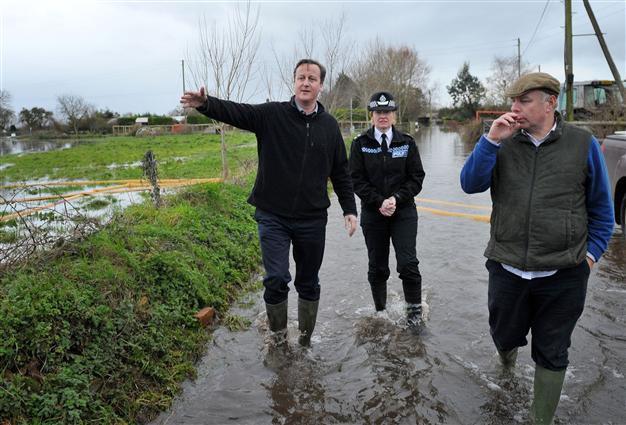UK's Cameron visits flooded areas as blame game escalates
BURROWBRIDGE, England - Reuters

British Prime Minister David Cameron (L) with Bridgwater and West Somerset MP, Ian Liddell-Grainger (R) during a visit to Goodings Farm in Fordgate, Somerset on February 7, 2014. AFP Photo
Britain's top political leaders headed to flood-hit areas of south-west England on Monday as they looked to limit the growing fallout from the government's handling of the crisis.Prime minister David Cameron returned to the area for the second time in four days, visiting Dorset, while Deputy Prime Minister Nick Clegg arrived in badly-flooded Somerset.
Parts of Britain have seen their wettest January on record and around 5,000 homes have been flooded, with some remaining under water for more than a month.
Anger among residents over the slow response to the crisis and the lack of resources put into preventing it in the first place have led to a pointing of fingers over whether Britain's Environment Agency or government is to blame.
Cameron's spokesman said part of the problem had been the failure to dredge rivers, a measure he said had been cut back since the Environment Agency was established in the late 1990s.
"The prime minister is keen to make sure that everything that can be done is being done and as part of that he is determined to see as much of the impact for himself as he can," Cameron's spokesman said of Monday's visit to the region.
Last week, the government pledged an extra 130 million pounds ($213 million) to help with the repairs and maintenance of flood defences, and the military have been drafted in to help build defences and evacuate homes.
Cameron has described the scene in the Somerset Levels, an artificially drained wetlands area prone to flooding, as "biblical".
On top of the devastation in the south west, the Environment Agency has issued severe flood warnings for areas of the River Thames west of London, and the Thames Barrier was closed on Monday to protect east London from flooding.
Environment Agency Chairman Chris Smith, who has faced calls to resign over the handling of the crisis, defended his department's record and blamed government rules on limits to funding available for individual flood prevention schemes.
"When politicians start saying it's Environment Agency advice or decisions that are to blame, they need to realise that it's in fact government rules ... that are at the heart of the problem," he wrote in the Guardian newspaper.
"There's no place for playing politics in the serious business of flood protection."
Politicians have been keen to be seen showing their concern for those affected with Nigel Farage, the leader of Britain's anti-EU UK Independence Party, donning waders to listen to residents' concerns over the weekend.
Rail links to much of the south west, a popular area for tourism, remained cut off ahead of school holidays next week.
Rob Wood, chief UK economist at Berenberg, said the wider economic impact of the floods would depend on how quickly the weather dissipated.
"Previous episodes of bad weather like snow have taken upwards of 0.1, 0.2 (percentage points off quarter-on-quarter GDP)," he said, adding that sectors such as construction and manufacturing would likely be worst hit.
"If it snows in January and February, then you maybe don't make up the loss until the second quarter so you have the whole quarter depressed."
















